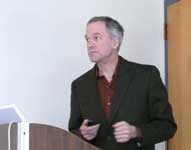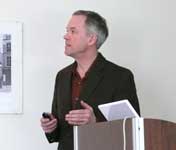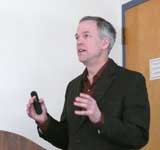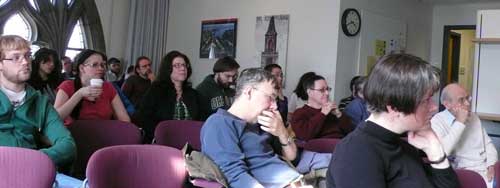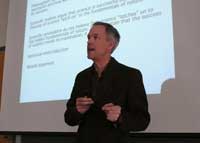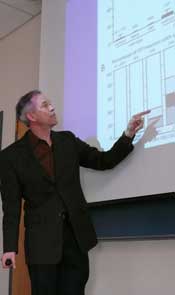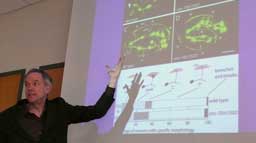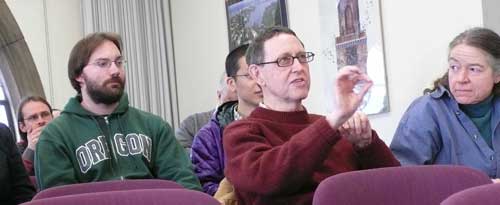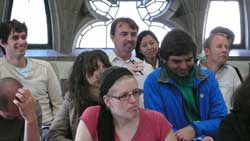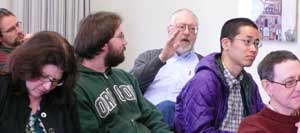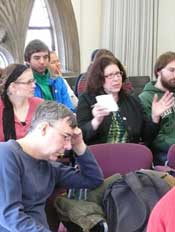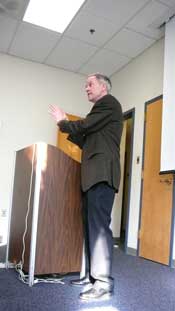::: center home >> being here >> last donut? >> getting somewhat real |
Getting Somewhat Real
Friday, 26 March 2010
My plans had not been to write about Ken's talk. I've just been too busy over the last few weeks to indulge in the luxury of writing "donuts" pieces. But the content of his talk had gripped us and kept coming back. Just moments ago, Slobodan Perovic was hovering in my doorway musing on the talk. Ken's topic was a familiar one. It is the realism-antirealism debate. That debate riveted my generation of philosophers of science as we made our way from graduate students and past assistant professorships to the greater security of tenure. As we rose, fewer new ideas entered the debate and we were distracted by other problems. The topic began to languish. However its fundamental tensions persisted and lingered on somewhere in our thoughts as perpetually unfinished business. These tensions, I soon learned as Ken worked more deeply into his talk, had continued to nag at him as well. It took Ken a while to get there. He first reviewed the sad story of the failure of genomic epidemiology, leading up to the query of whether philosophy of science might prove useful after all in illuminating it. The field depended on some fundamental theorizing that Ken was egging us to doubt. Then he turned to the two principal arguments that have long dominated the realism-antirealism debate, each pulling in opposite directions. On the one side is a sense that realists find overpowering: science has in many cases gotten it right at telling us what is really in the world. There is no other way to account for the great success of science. It would be--and here comes The Word--a miracle, if the science were wrong, yet enjoyed this success.
We feel the pull of both arguments and are so used to being torn apart by them that it has become a fixture in our philosophical lives. It is an old injury that brings familiar pains on damp days. Ken's idea was that we do not need to be pulled asunder by these competing arguments. We can accept both; we merely need to apply them in different areas. Take the historical meta-induction. That should be applied to fundamental theory. It is the content of theory at the most fundamental level that has proven fragile and revisable. We should be antirealists when it comes to that material. What of the miracle argument? It should be applied at the level of practice. There we meet "situated claims." They compel belief by virtue of revealing robust difference makers. If the only thing that distinguishes two cases initially is that, then that causes all ensuing differences in the two cases. This version of realism, Ken noted, differs from the tendency in recent versions of realism, such as structural realism. These common versions seek to attach realism to the components of highest level theory--its structure, for example. Ken's realism is not top down. It is bottom up. Realism is attached to the grubby depths of real practice in science. Ken calls this view "Somewhat Antirealist Bottom Up Realism" or "SABUR." Perhaps he was imagining a saber that cuts through a Gordian knot? I wanted to tell him that this was probably not an effective choice of name. It seemed inhospitable as his host to complain about this minutia so I let it pass. And if you don't say anything to him, he'll never know. Right? All this is merely a sketch of Ken's talk. He is a philosopher of biology, deeply immersed in the intriguing details of genes and DNA. His claims were illustrated richly with an expanding repertoire of examples in biology. The fundamental theory soon to be shredded by the historical meta-induction makes overreaching claims about genes determining phenotypes and about information being passed around by genes; it uses anthropomorphic talk; and more. The situated claims, however, are much narrower. The difference makers are gene differences that now assuredly produce phenotypical differences. They have a causal specificity that eludes fundamental theorizing, whose true role turns out to be to engender "excitement." In my terms, that is the fancy talk that keeps the biologists at their lab benches; and the media pop and sparkle that loosens the strings of funders' purses.
The emphasis on practice, however, was troubling me. The term is elsewhere wielded as a rebuke. It suggests that unseen opponents write about an idealized fairyland, telling tales of science remote from the real grit of the laboratory bench, whereas those who speak of practice have the immediate authority of real science at their call. Too often, the rebuke is undeserved and the new practical insights feeble. While there was no such scolding in Ken's story, I had been irked enough by the term in other places to listen now if "practice" meant anything more than "not far removed logically from experimental results."
A weekend has passed and a new week has begun. The ideas Ken planted are taking root. Slobodan is standing in my door confiding, "There's really something wrong with this debate. It needs to be reframed, but I just don't know how." "Yes, I agree," I said, "I've have had the same thought; and I don't know how to reframe it." John D. Norton Somewhat Antirealist Bottom-up Realism |


